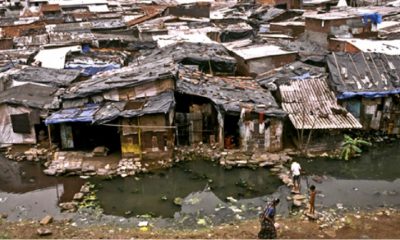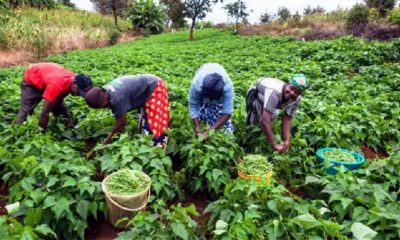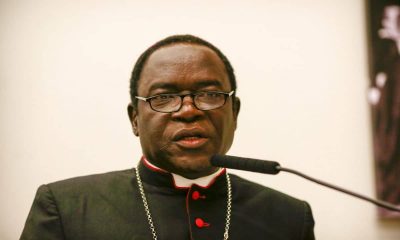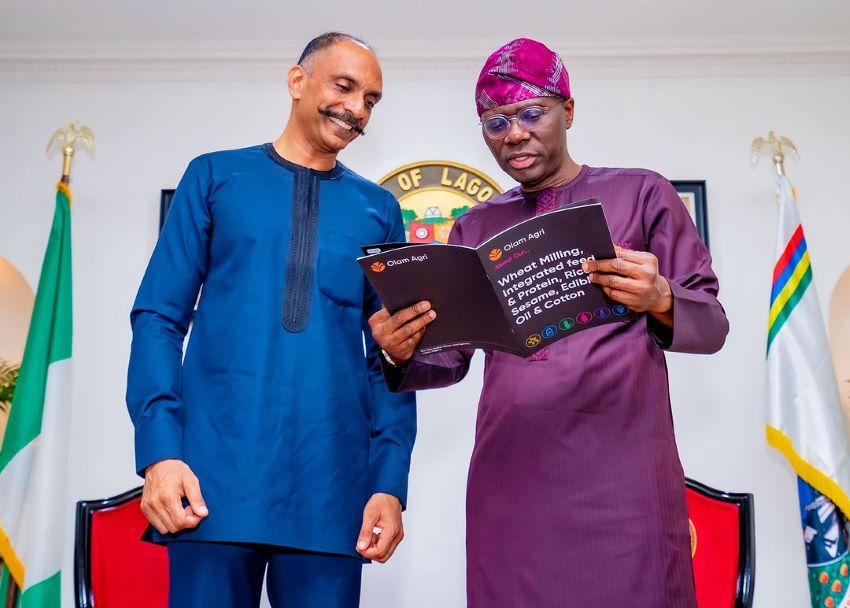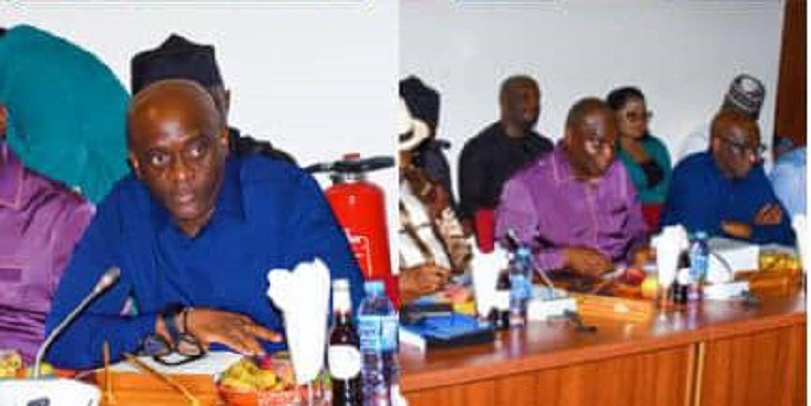Feature/OPED
Food Crisis And Nigeria’s Multi Dimensional Poverty
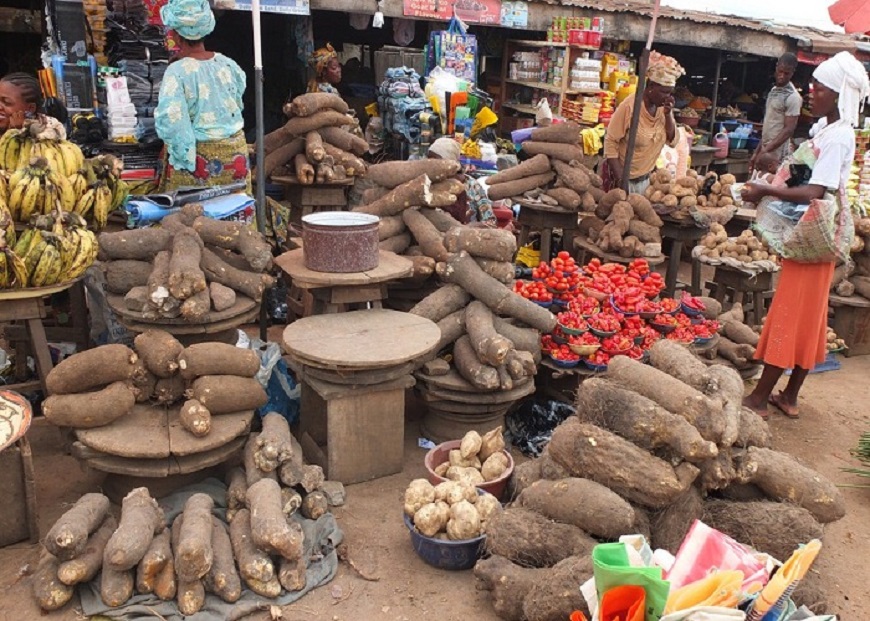
By Jerome-Mario Utomi
If there is any fresh fact that supports the claim by the National Bureau of Statistics (NBS) in November 2022 that the Multidimensional Poverty Index (MPI) is higher in rural areas than in urban areas, it is my experience during a short visit to Agbor, a community which, according to Wikipedia, is the most populous among the Ika people, located in and functions as the headquarter of Ika South Local Government Area of Delta State in South-south geo-political zone of Nigeria.
Among many other observations, the referenced report puts the MPI in rural areas at 72% and that of urban areas at 42%, thereby confirming that a much higher proportion of people living in rural areas compared to those living in urban areas are multidimensionally poor.
The report further noted that 63% (about 133 million people), that is about 6 out of every 10 Nigerians, are multidimensionally poor, with 65% (86 million) and 35% (47 million) of the poor living in the North and South of Nigeria, respectively. The implication is that location matters with respect to poverty and unemployment.
Essentially, as a Nigerian resident in Lagos, I have come across many reports that underlined Nigeria as a nation confronted with both food insecurity and crisis. Again, aside from witnessing commentators argue at different times and places that when food continues to rise in price, everyone feels it, but those with less money, understandably, feel it far more, as they have to spend more of their money on the essentials: housing and food.
I have also, on the other hand, before embarking on that trip, seen parents go without food to ensure that children can eat. Particularly, as prices of staple foods in Lagos, such as rice have reportedly morphed from N35.000 to well over N50,000. Other items such as noodles have equally and appreciably added in prices as the smallest pack which used to sell for N100 now hovers between N130 and N150.
While these heightened price regimes were considered worrying by Lagosians, new facts derived from my latest visit show that if the ongoing food inflation in Lagos is a challenge, the experience in local communities/small towns like Agbor is a crisis.
I arrived at Agbor in the evening and was adequately taken care of by my host and, therefore, made it straight to my hotel room without having any contact with food vendors within and outside the guest house.
The following morning, I thought it wise to observe my breakfast before resuming the assignment that brought me to the town. I approached the reception to ascertain what their breakfast arrangement looks like but was told in plain language that they have no provision/arrangement for such.
With that response, I stepped out onto Old Lagos-Asaba road and just a few buildings away from the guest house was a ‘fast food’ vendor. As it was breakfast that I needed, I politely requested that he prepare two packs (the smallest size) of noodles and two eggs for me. And just immediately, she replied; it will cost you N1,200. How come? I asked. If this is sold at this price, how can jobless Nigerians, particularly the youths, afford such meals? I further queried. Then she replied; Oga, that is the amount; it is either you buy or leave me alone. The jobless Nigerians you are talking about are already aware of the price regime. The rest they say is history.
Scene 2: In the afternoon of the same day, while on my way back to the guest house, I saw a woman who sells roasted yam by the roadside. The pieces of yam displayed were ‘wickedly’ cut into tiny framed sizes and could conveniently be likened to the worth sold for N100 in Lagos. I greeted the woman and thereafter, pointed at two pieces. She replied saying; it was N400. Without pressing further or seeking further clarification, I requested that she prepare it for me.
Handing over the yam to me, which was garnished with three pieces of meat sold at N600 (N200 a piece), I innocently flashed one thousand naira note at her. Lo and behold, the woman told me that I had to give her an additional N200 as the total value of what I bought was N1200. How come? When? I asked at the same time. It was then that she explained to me that the two pieces of yam were actually sold for N800 at N400 per piece.
Also devastating and of course another reason for us to be alarmed is the awareness that this galloping inflation in Agbor, Delta State and its environs is not limited to food items alone but affects accommodation. In what is in some ways a more brazen move is that in Agbor, house rent is higher when juxtaposed with the experience in some parts of Lagos.
This is the challenge facing communities in our republic. The high cost of food and accommodation in Agbor may have existed in an overt manner, the experience in other towns and communities in the country may be worse but exists in covert forms.
Talking about food insecurity in Nigeria, many have argued that the food challenge in the country has been impacted especially by violent conflicts, including the insurgency in the North East; armed banditry in the Northwest; perennial farmer/herder conflicts in the North Central, South West, and increasingly across the country; and separatist agitation in the South East among others.
To others, the challenge is exacerbated by natural disasters; in particular, the rising incidence and frequency of floods in large parts is a consequence of climate change impact, which continues to affect food production and the availability and affordability of food.
A sterling example is the report by the National Emergencies Management Agency (NEMA), 2022 which among other remarks observed that floods led to the destruction and washing away of over 675,000 hectares of farmland.
“One can only imagine the extent of the impact of this scale of destruction of farmlands on agricultural activities and food production across the country. Farmers, the majority of whom are small-scale farmers, lost not only crops and harvests, but also farm animals, poultry, fishery, and farm implements to the raging floods.”
Whatever the true picture may be, there are in the opinion of this piece multiple reasons why the federal and of course state governments in Nigeria should undertake strategic efforts to solve the problem of food inflation not just in Agbor but across the country.
Aside from the fundamental relationship between the food crisis and inflation and its harmful effects on every economy, the human population in the country quadrupled and unemployment multiplied in the past decades and the average impact of this uncontrolled increase on the nation’s economy is tellingly obvious.
Undoubtedly, I believe and still believe that as a country desirous of achieving sustainable development, the recent decision by the Federal Government to launch the conditional cash transfer policy for 15 million households on October 17, 2023, will not resolve the present hunger challenge in the country.
Rather, there are both specific and specialized reasons for the government to throw its weight behind agriculture by creating an enabling environment that will encourage Nigerian youths to take to farming.
First, aside from the worrying awareness that by 2050, global consumption of food and energy is expected to double as the world’s population and incomes grow, climate change is expected to have an adverse effect on both crop yields and the number of arable acres, we are in dire need of solution to this problem because unemployment has diverse implications.
Security-wise, a large unemployed youth population is a threat to the security of the few that are employed. Any transformation that does not have job creation as its main objective will not take us anywhere and the agricultural sector has the capacity to absorb the teeming unemployed youth in the country.
The second reason is that globally, there are dramatic shifts from agriculture in preference for white-collar jobs, a trend that urgently needs to be reversed.
Separate from job creation, averting malnutrition which constitutes a serious setback to the socio-economic development of any nation is another reason why Nigeria must embrace agriculture, a vehicle for food security and a sustainable socio-economic sector.
In fact, it was noted recently that in Nigeria, governments over the years have come to realize that sustainable growth is achievable only under an environment in which the generality of the people is exposed to a balanced diet, not just food. This explains why agricultural production should receive heightened attention. In Nigeria, an estimated 2.5 million children under five suffer from severe acute malnutrition (sam) annually, exposing nearly 420,000 children within that age bracket to early death from common childhood illnesses such as diarrhoea, pneumonia and malaria.
This is the best time for President Bola Ahmed Tinubu-led federal government and state governors to serve and save Nigerians from malnutrition and multi-dimensional poverty.
God bless Nigeria!!!
Utomi Jerome-Mario is the Programme Coordinator (Media and Policy) at the Social and Economic Justice Advocacy (SEJA), Lagos. He could be reached via je*********@***oo.com/08032725374
Feature/OPED
How Christians Can Stay Connected to Their Faith During This Lenten Period

It’s that time of year again, when Christians come together in fasting and prayer. Whether observing the traditional Lent or entering a focused period of reflection, it’s a chance to connect more deeply with God, and for many, this season even sets the tone for the year ahead.
Of course, staying focused isn’t always easy. Life has a way of throwing distractions your way, a nosy neighbour, a bus driver who refuses to give you your change, or that colleague testing your patience. Keeping your peace takes intention, and turning off the noise and staying on course requires an act of devotion.
Fasting is meant to create a quiet space in your life, but if that space isn’t filled with something meaningful, old habits can creep back in. Sustaining that focus requires reinforcement beyond physical gatherings, and one way to do so is to tune in to faith-based programming to remain spiritually aligned throughout the period and beyond.
On GOtv, Christian channels such as Dove TV channel 113, Faith TV and Trace Gospel provide sermons, worship experiences and teachings that echo what is being practised in churches across the country.
From intentional conversations on Faith TV on GOtv channel 110 to true worship on Trace Gospel on channel 47, these channels provide nurturing content rooted in biblical teaching, worship, and life application. Viewers are met with inspiring sermons, reflections on scripture, and worship sessions that help form a rhythm of devotion. During fasting periods, this kind of consistent spiritual input becomes a source of encouragement, helping believers stay anchored in prayer and mindful of God’s presence throughout their daily routines.
To catch all these channels and more, simply subscribe, upgrade, or reconnect by downloading the MyGOtv App or dialling *288#. You can also stream anytime with the GOtv Stream App.
Plus, with the We Got You offer, available until 28th February 2026, subscribers automatically upgrade to the next package at no extra cost, giving you access to more channels this season.
Feature/OPED
Turning Stolen Hardware into a Data Dead-End

By Apu Pavithran
In Johannesburg, the “city of gold,” the most valuable resource being mined isn’t underground; it’s in the pockets of your employees.
With an average of 189 cellphones reported stolen daily in South Africa, Gauteng province has become the hub of a growing enterprise risk landscape.
For IT leaders across the continent, a “lost phone” is rarely a matter of a misplaced device. It is frequently the result of a coordinated “snatch and grab,” where the hardware is incidental, and corporate data is the true objective.
Industry reports show that 68% of company-owned device breaches stem from lost or stolen hardware. In this context, treating mobile security as a “nice-to-have” insurance policy is no longer an option. It must function as an operational control designed for inevitability.
In the City of Gold, Data Is the Real Prize
When a fintech agent’s device vanishes, the $300 handset cost is a rounding error. The real exposure lies in what that device represents: authorised access to enterprise systems, financial tools, customer data, and internal networks.
Attackers typically pursue one of two outcomes: a quick wipe for resale on the secondary market or, far more dangerously, a deep dive into corporate apps to extract liquid assets or sellable data.
Clearly, many organisations operate under the dangerous assumption that default manufacturer security is sufficient. In reality, a PIN or fingerprint is a flimsy barrier if a device is misconfigured or snatched while unlocked. Once an attacker gets in, they aren’t just holding a phone; they are holding the keys to copy data, reset passwords, or even access admin tools.
The risk intensifies when identity-verification systems are tied directly to the compromised device. Multi-Factor Authentication (MFA), widely regarded as a gold standard, can become a vulnerability if the authentication factor and the primary access point reside on the same compromised device. In such cases, the attacker may not just have a phone; they now have a valid digital identity.
The exposure does not end at authentication. It expands with the structure of the modern workforce.
65% of African SMEs and startups now operate distributed teams. The Bring Your Own Device (BYOD) culture has left many IT departments blind to the health of their fleet, as personal devices may be outdated or jailbroken without any easy way to know.
Device theft is not new in Africa. High-profile incidents, including stolen government hardware, reinforce a simple truth: physical loss is inevitable. The real measure of resilience is whether that loss has any residual value. You may not stop the theft. But you can eliminate the reward.
Theft Is Inevitable, Exposure is Not
If theft cannot always be prevented, systems must be designed so that stolen devices yield nothing of consequence. This shift requires structured, automated controls designed to contain risk the moment loss occurs.
Develop an Incident Response Plan (IRP)
The moment a device is reported missing, predefined actions should trigger automatically: access revocation, session termination, credential reset and remote lock or wipe.
However, such technical playbooks are only as fast as the people who trigger them. Employees must be trained as the first line of defence —not just in the use of strong PINs and biometrics, but in the critical culture of immediate reporting. In high-risk environments, containment windows are measured in minutes, not hours.
Audit and Monitor the Fleet Regularly
Control begins with visibility. Without a continuous, comprehensive audit, IT teams are left responding to incidents after damage has occurred.
Opting for tools like Endpoint Detection and Response (EDR) allows IT teams to spot subtle, suspicious activities or unusual access attempts that signal a compromised device.
Review Device Security Policies
Security controls must be enforced at the management layer, not left to user discretion. Encryption, patch updates and screen-lock policies should be mandatory across corporate devices.
In BYOD environments, ownership-aware policies are essential. Corporate data must remain governed by enterprise controls regardless of device ownership.
Decouple Identity from the Device
Legacy SMS-based authentication models introduce avoidable risk when the authentication channel resides on the compromised handset. Stronger identity models, including hardware tokens, reduce this dependency.
At the same time, native anti-theft features introduced by Apple and Google, such as behavioural theft detection and enforced security delays, add valuable defensive layers. These controls should be embedded into enterprise baselines rather than treated as optional enhancements.
When Stolen Hardware Becomes Worthless
With POPIA penalties now reaching up to R10 million or a decade of imprisonment for serious data loss offences, the Information Regulator has made one thing clear: liability is strict, and the financial fallout is absolute. Yet, a PwC survey reveals a staggering gap: only 28% of South African organisations are prioritising proactive security over reactive firefighting.
At the same time, the continent is battling a massive cybersecurity skills shortage. Enterprises simply do not have the boots on the ground to manually patch every vulnerability or chase every “lost” terminal. In this climate, the only viable path is to automate the defence of your data.
Modern mobile device management (MDM) platforms provide this automation layer.
In field operations, “where” is the first indicator of “what.” If a tablet assigned to a Cape Town district suddenly pings on a highway heading out of the city, you don’t need a notification an hour later—you need an immediate response. An effective MDM system offers geofencing capabilities, automatically triggering a remote lock when devices breach predefined zones.
On Supervised iOS and Android Enterprise devices, enforced Factory Reset Protection (FRP) ensures that even after a forced wipe, the device cannot be reactivated without organisational credentials, eliminating resale value.
For BYOD environments, we cannot ignore the fear that corporate oversight equates to a digital invasion of personal lives. However, containerization through managed Work Profiles creates a secure boundary between corporate and personal data. This enables selective wipe capabilities, removing enterprise assets without intruding on personal privacy.
When integrated with identity providers, device posture and user identity can be evaluated together through multi-condition compliance rules. Access can then be granted, restricted, or revoked based on real-time risk signals.
Platforms built around unified endpoint management and identity integration enable this model of control. At Hexnode, this convergence of device governance and identity enforcement forms the foundation of a proactive security mandate. It transforms mobile fleets from distributed risk points into centrally controlled assets.
In high-risk environments, security cannot be passive. The goal is not recovery. It is irrelevant, ensuring that once a device leaves authorised hands, it holds no data, no identity leverage, and no operational value.
Apu Pavithran is the CEO and founder of Hexnode
Feature/OPED
Daniel Koussou Highlights Self-Awareness as Key to Business Success

By Adedapo Adesanya
At a time when young entrepreneurs are reshaping global industries—including the traditionally capital-intensive oil and gas sector—Ambassador Daniel Koussou has emerged as a compelling example of how resilience, strategic foresight, and disciplined execution can transform modest beginnings into a thriving business conglomerate.
Koussou, who is the chairman of the Nigeria Chapter of the International Human Rights Observatory-Africa (IHRO-Africa), currently heads the Committee on Economic Diplomacy, Trade and Investment for the forum’s Nigeria chapter. He is one of the young entrepreneurs instilling a culture of nation-building and leadership dynamics that are key to the nation’s transformation in the new millennium.
The entrepreneurial landscape in Nigeria is rapidly evolving, with leaders like Koussou paving the way for innovation and growth, and changing the face of the global business climate. Being enthusiastic about entrepreneurship, Koussou notes that “the best thing that can happen to any entrepreneur is to start chasing their dreams as early as possible. One of the first things I realised in life is self-awareness. If you want to connect the dots, you must start early and know your purpose.”
Successful business people are passionate about their business and stubbornly driven to succeed. Koussou stresses the importance of persistence and resilience. He says he realised early that he had a ‘calling’ and pursued it with all his strength, “working long weekends and into the night, giving up all but necessary expenditures, and pressing on through severe setbacks.”
However, he clarifies that what accounted for an early success is not just tenacity but also the ability to adapt, to recognise and respond to rapidly changing markets and unexpected events.
Ambassador Koussou is the CEO of Dau-O GIK Oil and Gas Limited, an indigenous oil and natural gas company with a global outlook, delivering solutions that power industries, strengthen communities, and fuel progress. The firm’s operations span exploration, production, refining, and distribution.
Recognising the value of strategic alliances, Koussou partners with business like-minds, a move that significantly bolsters Dau-O GIK’s credibility and capacity in the oil industry. This partnership exemplifies the importance of building strong networks and collaborations.
The astute businessman, who was recently nominated by the African Union’s Agenda 2063 as AU Special Envoy on Oil and Gas (Continental), admonishes young entrepreneurs to be disciplined and firm in their decision-making, a quality he attributed to his success as a player in the oil and gas sector. By embracing opportunities, building strong partnerships, and maintaining a commitment to excellence, Koussou has not only achieved personal success but has also set a benchmark for future generations of African entrepreneurs.
His journey serves as a powerful reminder that with determination and vision, success is within reach.
-

 Feature/OPED6 years ago
Feature/OPED6 years agoDavos was Different this year
-
Travel/Tourism10 years ago
Lagos Seals Western Lodge Hotel In Ikorodu
-

 Showbiz3 years ago
Showbiz3 years agoEstranged Lover Releases Videos of Empress Njamah Bathing
-

 Banking8 years ago
Banking8 years agoSort Codes of GTBank Branches in Nigeria
-

 Economy3 years ago
Economy3 years agoSubsidy Removal: CNG at N130 Per Litre Cheaper Than Petrol—IPMAN
-

 Banking3 years ago
Banking3 years agoSort Codes of UBA Branches in Nigeria
-

 Banking3 years ago
Banking3 years agoFirst Bank Announces Planned Downtime
-

 Sports3 years ago
Sports3 years agoHighest Paid Nigerian Footballer – How Much Do Nigerian Footballers Earn


